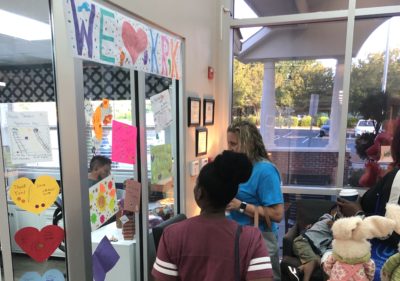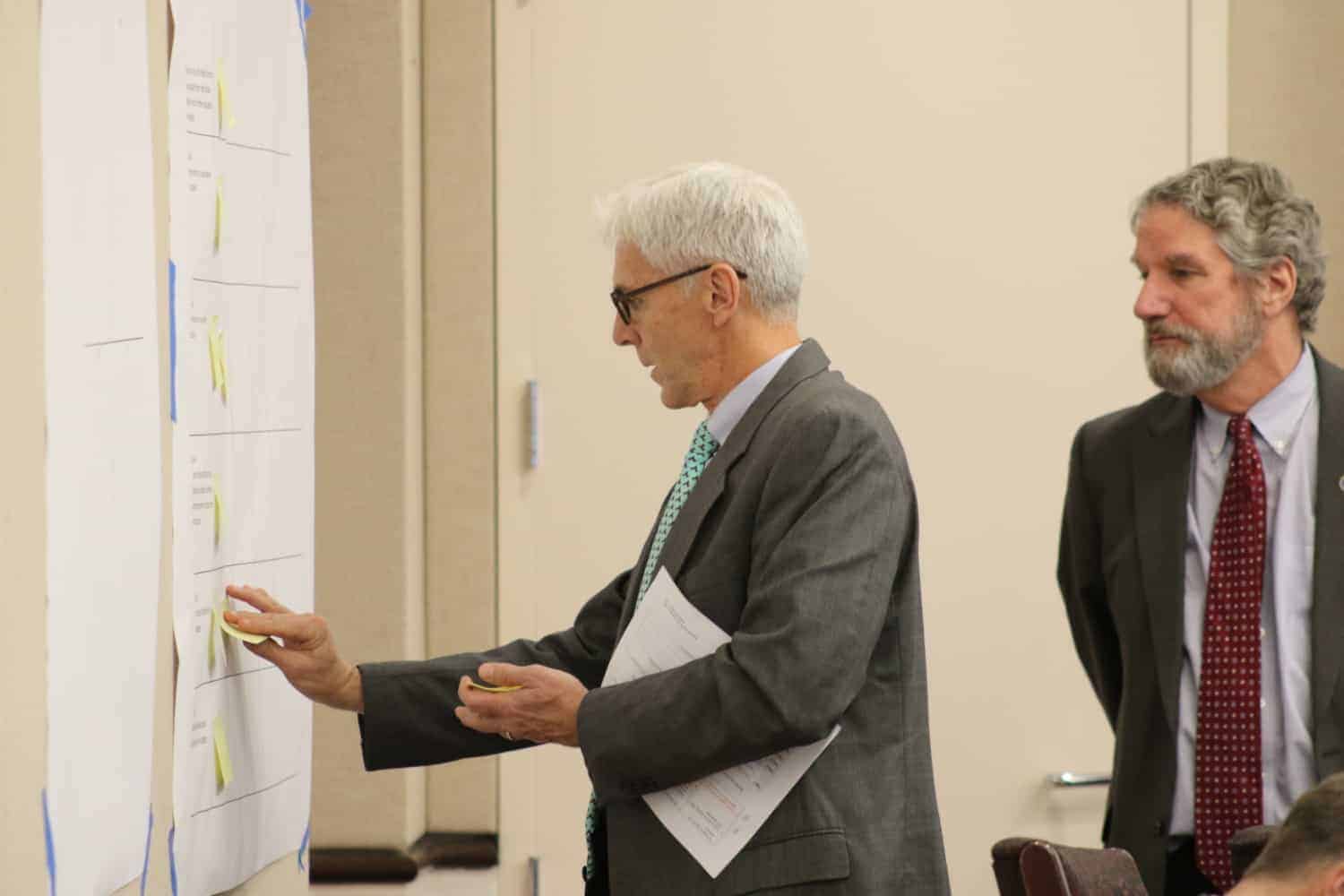The State Board of Education emerged from its monthly meeting with an array of tasks: a Department of Public Instruction (DPI) performance audit starting next week, budget cuts left to be determined, and changes made to teacher licensure policy and the state’s Every Student Succeeds Act (ESSA) plan.
The board must decide where to make state-mandated DPI cuts of $5.1 million in the coming months if nothing changes during the legislature’s upcoming short session. Superintendent of Public Instruction Mark Johnson said the performance review will not focus on budget cuts but will be presented in time to inform the board’s decisions.
“If they come in here and they say, ‘This department can not handle any more cuts,’ then that’s the answer,” Johnson said to the board Wednesday. Ernst & Young, a business management consulting company, will take a “deep dive,” said Johnson, into the operational effectiveness of the education agency.
“I have been advocating for a third-party evaluation of DPI’s operations since before I was elected,” Johnson said in a press release Wednesday. “This project will look at how we are structured, what kind of work we do, and our business processes to see what’s working well and what can be improved. We look forward to working with EY and reviewing the findings to improve our service to North Carolina’s students and educators.”
Board members were concerned with a tight timeline to review the audit, approve cuts, and notify DPI staff who may have to be laid off by the end of the fiscal year (end of June). But Johnson said he would like to wait until the General Assembly is in session to see if those cuts are necessary before publicly deciding anything. He suggested asking for a cancellation or delay of cuts within the board’s budget expansion request, which is sent to the governor’s office and the legislature before the session begins.
“When we actually want to go and lobby the General Assembly, saying, ‘Don’t make these cuts,’ we definitely don’t want to have a plan approved saying, ‘Well, here are all the cuts we’re going to make,’ and make that public,” Johnson said.
In the event that employees do not have enough notice before the fiscal cut-off — around 60 days — Johnson said the department could use funds from elsewhere in the department’s budget to maintain those individuals’ employment.
Adam Levinson, DPI’s chief financial officer, said that takes away flexibility in an already tight budget.
“What that means is that you are using some other money in the budget on a one-time basis to cover that instead of what it was budgeted for,” Levinson said.
ISD operator still unnamed
The board approved a 60-day delay Thursday in the selection of an outside entity to operate the Innovative School District, which will eventually include five low-performing schools from across the state. Southside-Ashpole Elementary School in Robeson County will open as the district’s first school in August.
The Robeson County Board of Education voted unanimously in January to turn the school over to the district. The other option was to close the school. The organization that will manage the district was supposed to be selected by mid-February. ISD Superintendent Eric Hall told the board Thursday the two organizations that have applied for the role, The Romine Group and Achievement for All Children, were not prepared to do the job at this point.
“In reviewing the evaluations, I can not stand here today and tell you that we have a match,” Hall said. “At this point in time, I don’t see where either of the two applicants meet the expectations that we have for this work at this time. Now that simply means that we have more questions, we have more information that we need to understand, and we need to take a deeper dive to see what are the capabilities and what are the possibilities of these organizations…”
Hall said he will first go into negotiations with the two organizations to ask more questions before opening the application to other entities. He said the project is about creating a new educational model, one that does not have to be run by a charter management organization. The operator, Hall said, could legally be a business, a nonprofit organization, a college or university, or even a single educator with experience in low-performing school turnaround.
“The real innovation of this work goes back to what I said six months ago: It’s about innovative partnerships,” Hall said. “It’s about doing something different and something that creates a brand that is unique to North Carolina, learning from what others states have done.”
ESSA update
As the board and DPI continue in a back-and-forth with the U.S. Department of Education regarding the Every Student Succeeds Act (ESSA) plan, some small technicalities could have big implications for schools.
Most changes requested by the federal government deal with school accountability, said DPI officials Lou Fabrizio and Tammy Howard. Alternative schools, which serve students who are “at-risk” for academic failure, have historically had flexibility when it comes to the state’s A-F system, which gives grades based on a formula of 80 percent achievement and 20 percent growth. Alternative schools have had other options, like sending students’ test scores back to the schools they attended originally, using a formula that puts more emphasis on growth, or designing their own formula.
The federal education department would like for the state to require a student performance grade for alternative schools if they have sufficient data to do so. Howard said about a quarter of alternative schools in North Carolina would not have enough data.
State board member Amy White said alternative schools typically have high growth scores but struggle academically. White said she has heard from alternative school leaders who say their schools would have failing grades of Ds and Fs if alternative accountability methodology was not an option.
“That’s very concerning to them because they feel like they are doing their very best to reach the most challenged students,” White said.
Johnson said he would support pushing back against this requirement. Vice Chair Buddy Collins agreed.
“If it is indeed a federal issue, it seems to run counter to the idea that the ESSA plan turns it back to the state to do what it needs to do,” Collins said. “I wonder whether or not reaching out to Congresswoman (Virginia) Foxx might be in order, because this seems to be an overreach by the U.S. Ed, on something that affects our most vulnerable children in a way that doesn’t sit right with me.”
On Thursday Howard said the state will fulfill the ESSA requirements for now but plan to request a waiver from assigning the schools a performance grade. She said DPI could continue to report the school performance grades as they currently do.
“One thing that this will also allow is in the reporting, though we’re required federally in ESSA for every school to have a performance grade,” Howard said, “we feel as though we could also recommend to continue with the state board policy…”
Teacher licensure
After the passage of legislation last year that reworks the state’s educator preparation and teacher licensure system, the board is working to align its policies with state law.
The Professional Educator Preparation Standards Commission, which was created by the same legislation, made several recommendations to the board, which it approved Thursday, regarding the new system.
For example, if a teacher wants to convert from an initial three-year license to a five-year license, the board approved a change saying he or she must be considered “proficient” on all five of the state’s standards instead of three of the five.
Under the updated policies, student support personnel (school staff like media specialists and counselors) have the same testing requirements as classroom teachers. These individuals have normally had three years to complete the necessary coursework and testing to maintain their licenses. Now, similar to teachers, they must attempt the test in their first year and pass it by their second year.
“What the commission is saying is these folks are more like teachers than like administrators and so it makes sense for us to align the testing requirements to look more similar to what teachers have to meet in order to be qualified and maintain their license,” said Tom Tomberlin, DPI’s director of district human resources.
Jason Griffin, who sits on the board as a principal advisor, said he thinks that change will be a positive one for an already overwhelmed system.
“For me, I’m excited about the changes,” Griffin said. “I honestly think this is going to speed up the process.”
Another change would affect some teachers who received their licenses in a state other than North Carolina. Previously, the state has accepted the teacher if he or she met the minimum test score required by the state in which the individual took the test. The board approved language now requiring teachers who took the same test administered in North Carolina to meet North Carolina’s minimum score. If another test is administered, Tomberlin said the comparability is considered by the department’s licensure division. He said there are about 10 states that use the same exam, some from which the state heavily recruits, and that most of them have the same cut score.
Board member Eric Davis expressed concern that the change could drive educators away from the state.
“While we clearly want to raise the quality, we also are aware of the kind of shortage that we’re dealing with,” Davis said.
Budget priorities
With cuts in the back of their minds, board members began creating their budget expansion request, which will be sent to the governor’s office and the legislature.
The board broke into small groups on Wednesday to brainstorm its priorities and resources needed to reach those priorities. Out of the board’s six strategic goals, the small groups each ranked excellent educators as their first priority, followed by post-secondary preparedness upon graduation, educational equity for all students (a recently added goal); the health, safety, and responsibility of students; personalized education; and districts’ financial, business, and technological soundness.
2016-17 Teacher of the Year Bobbie Cavnar noted locally-grown educator pipelines as an inexpensive and important opportunity.
“One of the things that I’ve been talking about is we need to stop saying, ‘How do we recruit teachers to North Carolina?’ and start talking about how do we recruit young people to become teachers who already have other reasons for living in North Carolina,” Cavnar said. “They are cemented in communities, like rural communities, for other reasons.”
The budget expansion request will consolidate the board’s priorities in a final draft, which will return for a vote at the board’s March meeting.
Recommended reading




